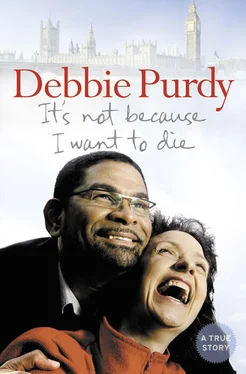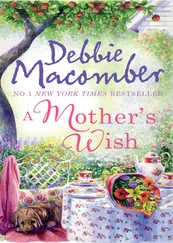It was an irresistible offer and I took less than a nanosecond to reply. ‘Sure. I’m on my way.’
I found people to look after the house I owned in Bradford and booked a plane ticket for 24 September. Before I left, I decided to pay a quick visit to my GP just to be on the safe side.
I sat down in his surgery and let the words pour out. ‘I’ve been a bit out of sorts recently. I’m sure it’s partly grieving for Mum, but also I’ve put on some weight that I need to lose, and living in the UK doesn’t really suit me. I prefer a hot climate and an outdoor lifestyle. Anyway, I’m solving it by moving out to Singapore next week. What do you think?’
‘That all sounds very sensible,’ the doctor said, a bit bowled over by the speed at which I can talk when I get going.
All the symptoms I presented him with were subjective: a bit tired, feeling slightly weak, generally depressed. I answered my own questions as I spoke and he just agreed with me. I didn’t have a massive tumour anywhere. I wasn’t in pain. There was nothing concrete that might have made him suspicious that there was anything going on. Besides, I didn’t want to hear any bad news. All I wanted was reassurance. I had a plane to catch and an exciting new life waiting for me, so I more or less presented him with a fait accompli.
‘So I’m fine to go?’
‘Yes,’ he said, looking somewhat baffled by the onslaught. ‘Have a good time.’
The symptoms didn’t go away in Singapore’s sunnier climes, though. If anything, they got worse. I started walking everywhere to try and get fit but found my legs were tired after short distances, and I couldn’t swim as many lengths of a swimming pool as I used to. Then, within three weeks of my arrival, I got a phone call that shattered my world. It was from my auntie Judy’s husband, Uncle Paul.
‘Debbie?’ he said. ‘Your dad is dead.’
‘What? You’re joking!’ He’d come out with it so abruptly that I assumed it was a sick practical joke, even though I knew Paul would never be so cruel.
Auntie Judy took the phone from him. ‘I’m so sorry,’ she said. ‘I’m afraid he had a heart attack.’
‘Really? My dad? Are you sure?’ He was such a life-force it didn’t seem possible.
‘His girlfriend was with him at the time, but there was nothing that could be done. He was dead before the ambulance got here.’ She was trying hard to hold back the tears and not doing too well.
I had talked to Dad the week before I left the UK. He’d been living in the States and was due to arrive in England a couple of days before I left so that we would see each other, but work had delayed him. I’d enquired about changing my flight, but it was a cheap ticket and to change it would cost almost as much as I’d paid for it in the first place. Instead we’d agreed to meet when he came to Southeast Asia a few months later.
I put the phone down and looked around at the friends in the room. They were watching me with concern, having picked up the gist of the call.
‘I’m an orphan,’ I told them, before bursting into tears.
The shock was monumental. How could there have been no warning signs at all? It felt like the end of the world.
One of Mildred’s friends bought me a plane ticket home for the funeral, and my sisters, Tina, Gillian and Carolyn, and my brother, Stephen, and I clung to each other in disbelief. More than two years had passed since Mum’s funeral, but it felt very recent. We hadn’t lived with Dad for a long time, but we still felt bereft. Even in your 30s you want to feel that you have someone to fall back on. Uncle Tony and Auntie Judy, his brother and sister, were inconsolable. They had been close to him all their lives and the three of them adored each other.
A few days after the funeral I caught a flight back to Singapore. I didn’t know what to do, but I wanted to stay busy or I would have sat and sobbed all day long. I’d moved into the flat with Belinda and Tetsu, and there were always people milling around and gigs to attend. I said yes to every invitation as a way of keeping myself afloat, otherwise I would have sunk under the weight of grief.
Two weeks after I got back, in November 1994, Auntie Judy called again, utterly heartbroken. She was stuttering and could hardly get the words out. ‘Tony died. It was a heart attack.’ Apparently he was making a cup of tea when he collapsed and was dead before he hit the floor. He didn’t even disturb anything in the kitchen.
I felt numb this time. It was all too much. I didn’t have the money to fly home for another funeral, so I grieved in Singapore. Still shell-shocked about Dad, it was hard to take in this new piece of information.
Then there was a third blow. On the night of Uncle Tony’s funeral, Auntie Judy died as well. I think she died of a broken heart, because she was so distraught at losing her brothers. They’d all three been so close in life that somehow it made sense that they died close together. I think it would have been unbearable for the ones left behind if it had been any other way. Nevertheless, it was devastating for the family to have three funerals in a row.
I put my head down and tried to get on with life in Singapore. What else could I do? Being on the other side of the world helped to make it seem unreal. Part of me still felt that when I next went home they’d all be there, same as ever.
Mildred was like a mother to me in this period, sweeping me up into her vast group of friends and making sure I didn’t mope around too much. Belinda saw to it that I ate and slept, and I still had my work for the adventure travel brochures and the music magazines. I spent most evenings at clubs and live music venues, and I’d usually be up on the dance floor.
I love dancing, and I was lucky enough to have been born with a decent sense of rhythm (tone deaf, but I could move), but strangely I found my body wasn’t moving the way I wanted it to. I felt as though I was wading through honey, or as if I was wearing trainers and they were sticking to chewing gum that someone had dropped on the floor. (Unlikely, as the Singaporean government had banned the sale of gum.) It wasn’t that I was tired; my movements just felt slow and strange. I thought it was because of the extra weight I’d put on back in England, so I borrowed a bike to cycle around town and get fitter. I wasn’t fat, but I definitely wasn’t as toned as I’d have liked to be.
Soon after Dad’s funeral I began to have the weirdest headaches I’d ever had in my life. It felt as if something was reaching inside my skull and squeezing my brain. They only lasted for a few seconds at a time, but they were intensely painful. I became convinced that I must have a brain tumour. This was in the days before Mo Mowlam, the Labour Secretary of State for Northern Ireland, died as a result of her brain tumour, and my preconception was that they were quite a sexy thing to have. I’d go into hospital, have my head shaved, undergo brain surgery and then recuperate. Everything would be better within a few months and I thought it would be quite exciting. I could be ‘heroic Debbie’ with my bald head, admired for my stoicism.
I flew back to England to spend Christmas with my family, and while I was up in Yorkshire I went to see a GP, presented him with my self-diagnosis and asked to be referred for a CT scan. He didn’t play along, though.
‘Let me put it this way,’ he said. ‘We doctors have to do a kind of jigsaw puzzle. Say you find a bit of blue sky. You might not know exactly where it fits, but you know it’s sky.’
I concentrated hard, trying to work out how this related to my headaches and muscle weakness.
‘There’s nothing physically wrong with you,’ he continued. ‘You were grieving for your mum and felt terrible about losing her, and then your dad died. It’s all happened at once. I’m going to refer you to a therapist who can help you to talk it through.’
Читать дальше












